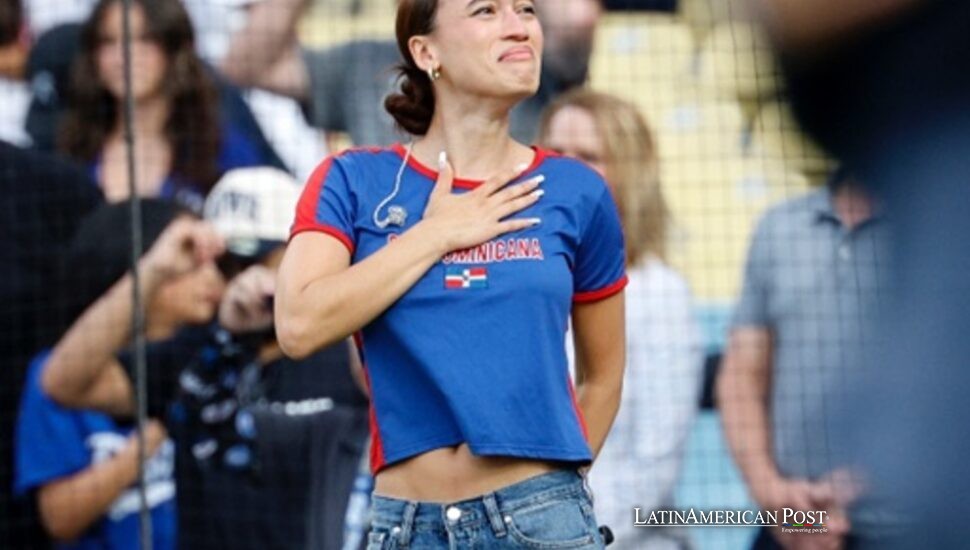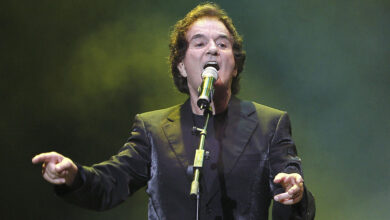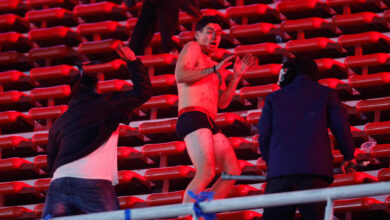Official Spanish Version of U.S. Anthem Resurfaces During Dodger Stadium Dissent

A pop star’s decision to sing a long-forgotten Spanish translation of “The Star-Spangled Banner” before a Dodgers game jolted Los Angeles—and the country—into remembering that the anthem once spoke two languages, even as immigration raids now police the very fans it hoped to unite.
A Solo That Cut Through Sirens
The first signal something was different came when the stadium organ fell silent. Nezza, the 29-year-old Dominican-American singer known for silky R&B hooks, walked to home plate in a royal-blue jersey that read “Quisqueya.” Moments earlier, a team liaison had urged her to perform the anthem “as written.” But outside the park, National Guard trucks idled at intersections, hemming in the eighth straight night of protests against federal immigration raids. So she ignored the cue, closed her eyes, and launched into “¡Mirad!, ¿podéis ver…?”—the opening line of El Pendón Estrellado, the only Spanish version ever authorized by Washington.
For ten seconds, the crowd froze. Then pockets of fans, many draped in Mexican flags, began to cheer. Phones shot upward; TikTok streams bloomed. When Nezza reached the high F on “Luz del alba,” her voice competed with helicopter rotors as LAPD airships banked over the outfield. Later, she told L.A. TIMES the risk felt worth it: “How could I sing in English while families were dragged from Avenida César Chávez?”
Kiké Hernández, the Dodgers infielder who once sneaked Puerto Rican flags into Fenway, tweeted moments after the first pitch: “Our anthem is big enough for every tongue. Proud of you, Nezza.” The team’s front office offered no statement, but TV cameras lingered on empty rows in the top deck—a visual reminder that fear, not pricing, had kept thousands away.
The Forgotten Verse Roosevelt Commissioned
Nezza’s rendition reopened a nearly lost chapter of U.S. cultural diplomacy. In 1945, President Franklin D. Roosevelt, eager to cement wartime alliances in Latin America, asked Peruvian-born composer Clotilde Arias to craft a singable Spanish translation of Key’s bombastic lyric. Arias labored for months over the puzzle—Spanish typically runs longer than English—yet managed near-perfect scansion. The sheet music, stamped “Department of State, Office of Inter-American Affairs,” toured embassies from Lima to La Paz before being locked in filing cabinets with the onset of the Cold War.
The score resurfaced in 2013 when Smithsonian curators, combing a backlog of World War II ephemera, found Arias’s neatly inked staves. A small 2016 exhibit drew niche press; then silence returned. “Good Neighbor sentiment evaporated the moment Washington viewed the hemisphere through an anti-communist lens,” explains historian Gregorio Mojica of the University of Texas. “A bilingual anthem clashed with the new mood of suspicion.”
Until Saturday night, only two known public performances had been documented: a 1946 radio broadcast in San Juan and a 1950 Pan-American Day ceremony in Mexico City. Nezza’s choice rocketed the song into a digital age Roosevelt could not have imagined, racking up four million views within 48 hours.
Surveillance Meets the Seventh-Inning Stretch
That viral wave crested as Los Angeles’ Latino community wrestled with 21st-century enforcement tools light-years from Roosevelt’s folky goodwill. Two days before the game, ICE confirmed a new contract with Palantir to integrate stadium CCTV feeds with its vast trove of driver-license photos and utility payment records. Stevie Glaberson, director at Georgetown’s Center on Privacy & Technology, told L.A. TIMES the upgrade means officers can “mark every face that walks through a turnstile, cross-rL.A. Timesrence it in minutes, and deploy field teams before the seventh-inning stretch.”
Fans felt the chill. Ticket platforms lit up with last-minute resale offers. Carmen García, a house cleaner whose undocumented sister had disappeared in a weekday sweep, sold her seats at a loss and watched on TV. “Nezza sang for us,” she says, “but I pictured ICE vans circling the lot.”
Inside, security remained routine, yet the psychological perimeter held. Vendors reported beer sales down 35 percent. The boisterous ta ta ta… cha-cha-cha of Pancho Villa’s Army drumline never materialized; the supporters’ group canceled its tailgate, posting, “We cannot party while aunties hide in closets.” Dodgers management, which has marketed aggressively to Mexican-American fans since Fernando Valenzuela’s meteoric 1981 season, faces a vexing paradox: welcoming the diaspora that fills its coffers while federal policy brands portions of that same crowd a deportation priority.
Lyrics That Refuse to Stay Buried
As Nezza’s last high note dissolved into a hush, some viewers heard more than nostalgia. Dolores Inés Casillas, author of Sounds of Crossing, describes Spanish-language anthems as “acoustic citizenship papers.” She tells L.A. TIMES, “When migrant voices enter a stadium PA, belonging is performed, not requested.” Arias’s text, lush with old-world floridity—”el pendón de estrellas… ondea triunfante aún”—carried a fresh charge against the day’s crackdowns.
In left field, a mural of Fernando Valenzuela—himself once a teenager who wrangled visas to chase a dream—seemed to nod approval. Fans draped flags of El Salvador and Guatemala over railings, a subtle dare to cameras scanning the crowd. One college student held a cardboard sign: “El pendón estrellado no se entrega.” The star-spangled banner does not surrender.
Also Read: Uruguay Dances Until Dawn as Quevedo’s ‘Buenas Noches’ Lights Montevideo
Whether the song returns on an even bigger stage remains open. FIFA’s 2026 World Cup will drop into U.S. cities heavy with Spanish tongues. Sports Business Journal reports private debate among organizers about allowing Arias’s version at opening ceremonies; civil-rights attorneys fret the tournament could pair mariachi fanfare with mobile fingerprint vans. The Department of Homeland Security, asked by L.A. TIMES if World Cup venues would mirror current “security partnerships,” said only that plans are “evolving.”
Nezza, riding a surge of downloads for her impromptu anthem, says she would sing again “in half a heartbeat.” “Music,” she insists, “is the only document nobody can confiscate.”




